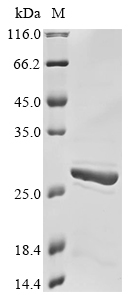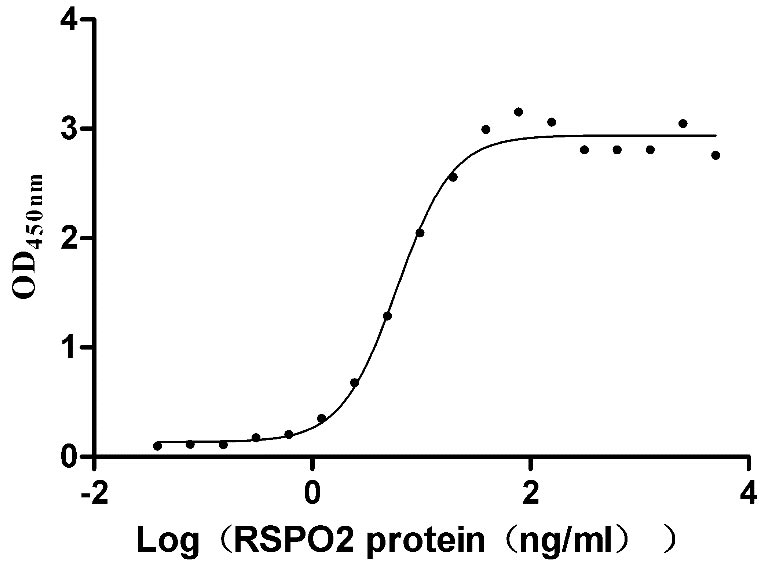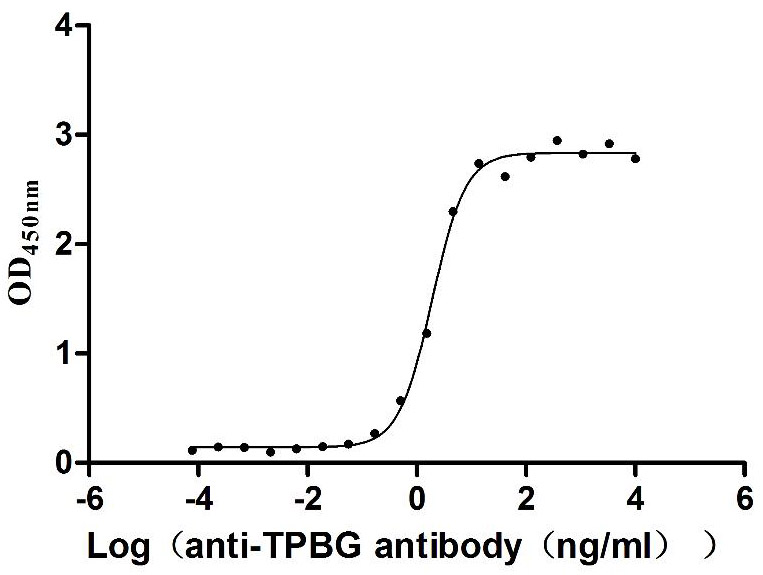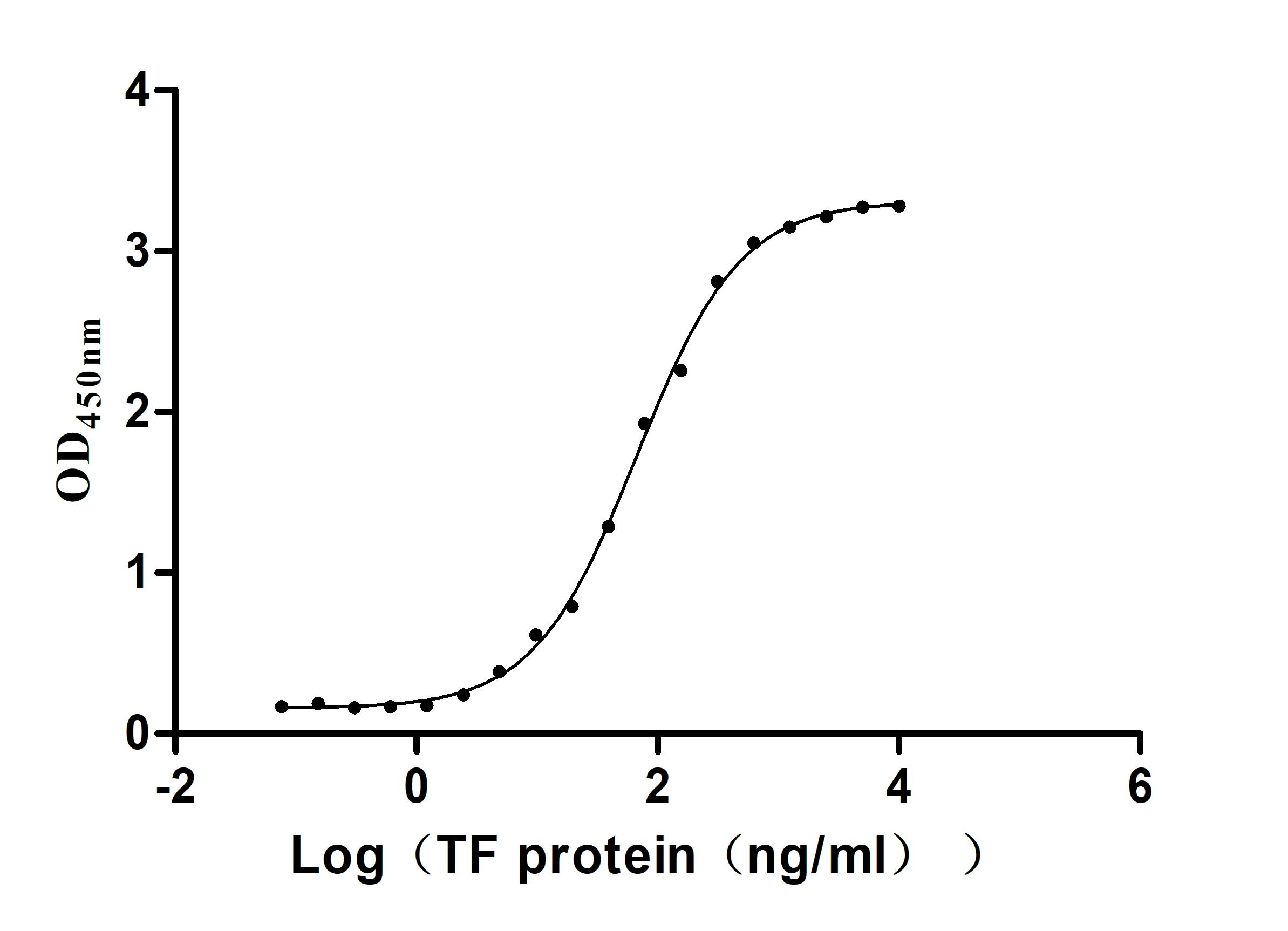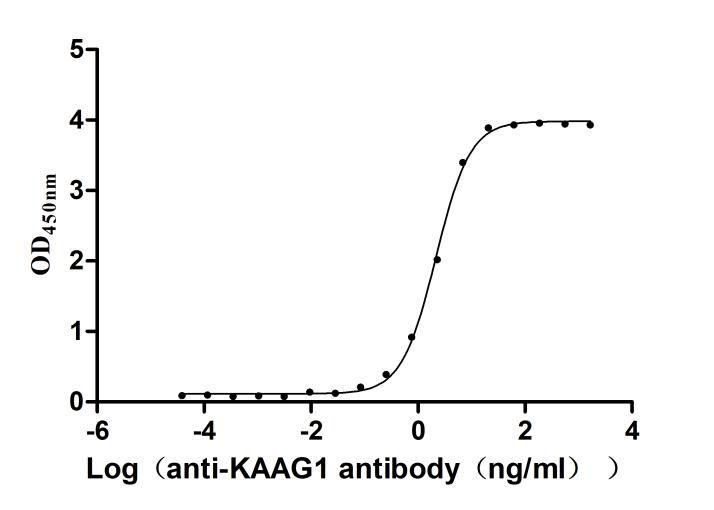Recombinant Human Angiopoietin-like protein 8 (ANGPTL8)
In Stock-
货号:CSB-BP757793HU
-
规格:¥2832
-
图片:
-
其他:
产品详情
-
纯度:Greater than 85% as determined by SDS-PAGE.
-
基因名:
-
Uniprot No.:
-
别名:ANGPTL8; C19orf80; RIFL; UNQ599/PRO1185Angiopoietin-like protein 8; Betatrophin; Lipasin; Refeeding-induced fat and liver protein
-
种属:Homo sapiens (Human)
-
蛋白长度:Full Length of Mature Protein
-
来源:Baculovirus
-
分子量:22.4 kDa
-
表达区域:22-198aa
-
氨基酸序列APMGGPELAQHEELTLLFHGTLQLGQALNGVYRTTEGRLTKARNSLGLYGRTIELLGQEVSRGRDAAQELRASLLETQMEEDILQLQAEATAEVLGEVAQAQKVLRDSVQRLEVQLRSAWLGPAYREFEVLKAHADKQSHILWALTGHVQRQRREMVAQQHRLRQIQERLHTAALPA
Note: The complete sequence including tag sequence, target protein sequence and linker sequence could be provided upon request. -
蛋白标签:N-terminal 10xHis-tagged
-
产品提供形式:Liquid or Lyophilized powder
Note: We will preferentially ship the format that we have in stock, however, if you have any special requirement for the format, please remark your requirement when placing the order, we will prepare according to your demand. -
缓冲液:Tris-based buffer,50% glycerol
-
储存条件:Store at -20°C/-80°C upon receipt, aliquoting is necessary for mutiple use. Avoid repeated freeze-thaw cycles.
-
保质期:The shelf life is related to many factors, storage state, buffer ingredients, storage temperature and the stability of the protein itself.
Generally, the shelf life of liquid form is 6 months at -20°C/-80°C. The shelf life of lyophilized form is 12 months at -20°C/-80°C. -
货期:3-7 business days
-
注意事项:Repeated freezing and thawing is not recommended. Store working aliquots at 4°C for up to one week.
-
Datasheet & COA:Please contact us to get it.
相关产品
靶点详情
-
功能:Hormone that acts as a blood lipid regulator by regulating serum triglyceride levels. May be involved in the metabolic transition between fasting and refeeding: required to direct fatty acids to adipose tissue for storage in the fed state.
-
基因功能参考文献:
- ANGPTL8 levels are lower in Prader-Willi syndrome than obese controls and are inversely associated with the severity of liver steatosis. Further studies should investigate the potential genetic basis for this observation. PMID: 28600576
- Inhibition of miR-143-3p amplified ANGPTL8 response to treatments (glucose, insulin, Lipopolysaccharides), suggesting that the miRNA acts to suppress ANGPTL8 expression under metabolically distorted conditions. PMID: 30261196
- Study suggests that ANGPTL8 levels in early pregnancy are significantly and independently associated with risk of GDM at 24-28 weeks of gestation. PMID: 29167926
- Circulating full-length ANGPTL8 concentrations in patients with dyslipidemia were significantly elevated as compared to controls. PMID: 30021605
- ApoCIII may mediate the effects of ANGPTL8 on triglyceride metabolism. PMID: 30021607
- Study shows that angiopoietin-like protein 8 (ANGPTL-8) was positively correlated with hepatocellular lipid content independent of obesity and insulin resistance, indicating that ANGPTL-8 might be a new and important important predictor of the severity of non-alcoholic fatty liver disease. PMID: 29266821
- We conclude that serum betatrophin concentrations were increased in pregnancies affected by hyperemesis gravidarium. PMID: 29754072
- Data suggest the angiopoietin-like 8 (ANGPTL8)/p62-IKKgamma axis as a negative feedback loop that regulates NF-kappaB activation, and extends the role of selective autophagy in fine-tuned inflammatory responses. PMID: 29255244
- ANGPTL8 levels are increased in both plasma and adipose tissues of subjects with hypertension. PMID: 29490644
- Serum ANGPTL8 concentrations were significantly increased in impaired glucose regulation and type 2 diabetes. PMID: 29082263
- the level of circulating betatrophin is positively associated with insulin resistance. PMID: 28931172
- we identified ANGPTL8 as the target gene at this HDL-C GWAS locus, determined regulatory drivers of tissue specificity, and combined fine-mapping approaches and regulatory overlap with experimental assays to identify variants that may contribute to the HDL-C GWAS signal at ANGPTL8. PMID: 28754724
- serum levels not associated with weight status, glucose tolerance, insulin resistance, or lipid metabolism PMID: 27402552
- Elevated betatrophin levels in polycystic ovary syndrome women, in the absence of obesity and glucose intolerance, may reflect a compensatory mechanism in order to counteract metabolic syndrome-related risk factors. PMID: 28319674
- betatrophin levels appeared to be related to the pathogenesis of the diabetic stages rather than prediabetic stages. PMID: 28351091
- Angiopoietin-like protein 8/betatrophin is related to liver steatosis, while visceral adipose tissue represents an additional site of expression in humans. PMID: 28351093
- ANGPTL8 reverses established Adriamycin induced cardiomyopathy by stimulating adult cardiac progenitor cells. PMID: 27823982
- Study provided an update to understand its physiological function from literature curated findings through an integrated view of ANGPTL8's regulation and its associated pathways. PMID: 28684091
- betatrophin is increased in pancreatic cancer-associated diabetes PMID: 27276680
- These results confirm a role for ANGPTL8 in lipoprotein metabolism and provide novel support for functional consequences of the rs2278426 variant. PMID: 27117576
- ANGPTL8 has a functional LPL inhibitory motif, but only inhibits LPL and increases plasma TG levels in mice in the presence of ANGPTL3 PMID: 28413163
- The inflammation-induced miR-221-3p regulates ANGPTL8 expression in adipocytes. This miRNA impact may become especially prominent under pathologic conditions such as morbid obesity, putatively contributing to the impaired adipose tissue lipid metabolism in metabolic disease. PMID: 28938482
- Circulating ANGPTL8 increases after bariatric surgery and predicts type 2 diabetes remission in morbidly obese patients. PMID: 28347650
- Data suggest that plasma betatrophin levels are significantly increased in lean (normal-weight) women with PCOS (polycystic ovary syndrome) compared to lean women without PCOS; plasma betatrophin levels are not significantly altered in overweight/obese women with PCOS compared to overweight/obese women without PCOS. This study was conducted in China. PMID: 27960599
- Especially the association to eGFR highlights the importance for future studies to address renal function as possible influence on betatrophin regulation and consider eGFR as potential confounder when analyzing the role of betatrophin in humans PMID: 28257453
- Serum betatrophin is an independent risk factor for nonalcoholic fatty liver and potential non-invasive marker for its progression. PMID: 28125672
- Cord blood betatrophin may function as a potential biomarker of maternal intrauterine hyperglycemia and fetal insulin resistance, which may presage for long-term metabolic impact of gestational diabetes on offspring PMID: 27196053
- The high levels of ANGPTL8 found in fetal life together with its relationship with newborn adiposity and brown adipose tissue point to ANGPTL8 as a potential new player in the modulation of the thermogenic machinery during the fetal-neonatal transition. PMID: 27469268
- Betatrophin levels were increased in women with PCOS and were associated with insulin resistance, c-reactive protein, and free-testosterone in these patients. PMID: 26832343
- Obesity is associated with increased betatrophin suppression after an oral glucose load; this response appears to be driven by hyperglycemia. Data suggest that the impaired betatrophin response in obese subjects is restored after weight loss and is comparable with the betatrophin response in lean individuals. PMID: 27459526
- Serum betatrophin levels are increased and associated with insulin resistance in patients with polycystic ovary syndrome. PMID: 28222635
- ANGPTL8/betatrophin might play an important role in glucose metabolism in the context of insulin resistance. PMID: 26387753
- This study supports that serum betatrophin plays an important role in MetS, involving the regulations of glucose and lipid metabolism and inflammation. PMID: 27238790
- our data shows that ANGPTL3, 4 and 8 are increased in obesity and type 2 diabetes (T2D). ANGPTL8 associates with ANGPTL3 in the non-diabetic subjects while it associated more with ANGPTL4 in the obese and T2D subjects. PMID: 27733177
- circulating betatrophin is increased in mice and humans with NAFLD and its expression was induced by endoplasmic reticulum stress in hepatocytes PMID: 27045862
- High betatrophin expression is associated with diabetic metabolic syndrome. PMID: 27578619
- Elevated betatrophin levels were associated with cardiometabolic risk factors a young population, but the association was largely dependent on vitamin D status. PMID: 27716289
- betatrophin may be associated with thyroid insufficiency but not thyroid autoimmunity. PMID: 27213151
- Betatrophin levels in patients with polycystic ovary syndrome (PCOS) are lower than those without PCOS and inversely related to insulin resistance. PMID: 27188865
- data shows for the first time that heterozygote form of ANGPTL8 Rs.2278426 variant was associated with higher FBG level in Arabs highlighting the importance of these variants in controlling the function of betatrophin. PMID: 26864934
- Serum betatrophin concentrations are increased in type 2 diabetes patients under antidiabetic treatment and positively associated with diabetic retinopathy. PMID: 26863068
- Compared with type 2 diabetes without cardiovascular disease (CVD), patients with CVD had remarkably higher levels of angiopoietin-like protein 8 (ANGPTL8). PMID: 27596060
- Circulating betatrophin concentration is negatively correlated with insulin resistance in obese children and adolescents. PMID: 27103367
- Meta-analysis results from case control studies on betatrophin and type 2 diabetes (T2DM) revealed increased circulating levels of betatrophin in patients with T2DM. PMID: 27242389
- ANGPTL8 levels were associated with baseline and future changes in triglyceride levels in Korean children. PMID: 26739706
- Betatrophin is significantly increased in T2DM patients with different stages of albuminuria. Betatrophin may be a novel endocrine regulator involved in DN development. PMID: 26739836
- ANGPTL8 is increased in subjects with MetS and it was significantly associated with HsCRP levels in different subgroups. PMID: 26850725
- Disruption of ANGPTL8 function in humans does not seem to have a large effect on measures of glucose tolerance. PMID: 26822414
- Based on the findings of our meta-analysis, circulating betatrophin level of T2DM patients is higher than that of nondiabetic adults in the nonobese population, but not in the obese population. PMID: 26697500
- In patients with diabetes mellitus type 2, betatrophin levels did not correlate with beta-cell function-related variables or insulin resistance-related variables PMID: 26649318
收起更多
-
相关疾病:Diabetes mellitus, insulin-dependent (IDDM); Diabetes mellitus, non-insulin-dependent (NIDDM)
-
亚细胞定位:Secreted.
-
蛋白家族:ANGPTL8 family
-
组织特异性:Predominantly expressed in liver. Also expressed in adipose tissues.
-
数据库链接:
HGNC: 24933
OMIM: 125853
KEGG: hsa:55908
STRING: 9606.ENSP00000252453
UniGene: Hs.534467

